Since my last update on the social media bubble, this sector's situation has gone from bad to worse. This should not come as a surprise to my readers who have followed my social media bubble warnings since June 2011 on my Twitter blog and on my website.
Shares of social media gaming company Zynga (ZNGA), the creators of "Farmville" and "Mafia Wars", have plunged by an incredible 86% since their March 2012 peak of almost $16 per share and are now trading at $2.15 - penny stock territory. Zynga CEO Mark Pincus has had $1.24 billion shaved off of his $2 billion net worth that he had last year due to the decline in Zynga's share price.
Zynga's stock carnage was triggered by both the dramatic decline of other social media-related stocks as well very disappointing revenue growth. In response, Zynga laid off over 100 employees, closed their studios in the UK, Japan, Chicago, Boston and Austin, Texas, and shuttered 13 of its games. As employee morale sank to new lows, some of Zynga's high-profile talent, including vice presidents and game developers, jumped ship.
Here's Zynga's stock chart: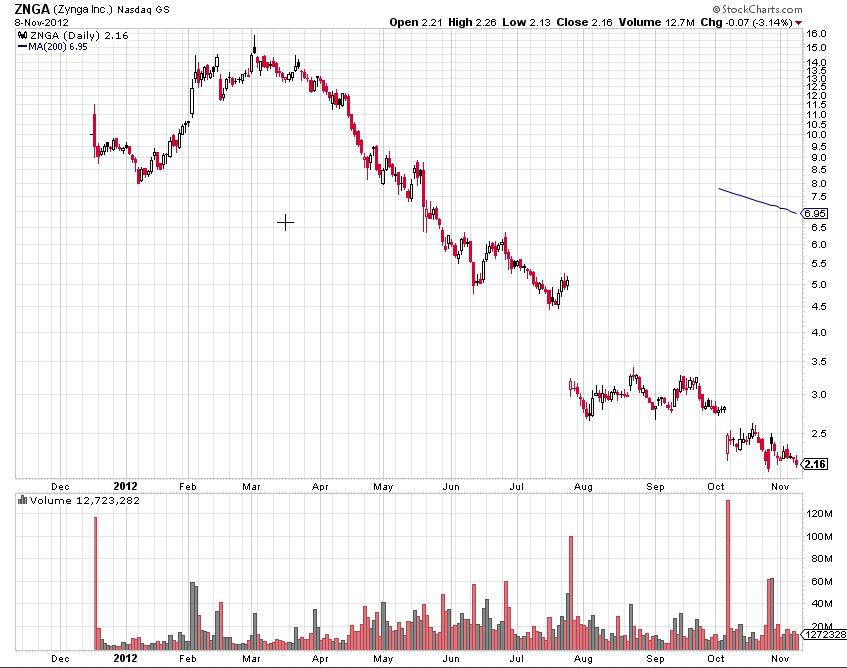
Groupon (GRPN), the group-buying deals site, has proven to be another high-profile social media/networking company disaster, with its shares collapsing 87% from their November 2011 peak of $31 to their current price of $3.92 - another penny stock, like Zynga.
Groupon CEO Andrew Mason saw his net worth decline from $1 billion to $200 million due to Groupon's stock price disaster. Groupon's crash was spurred by the overall social media stock meltdown, as well as its lackluster revenue growth as the company struggled to even hit the meager single-digit growth that analysts were projecting.
As Groupon's share prices plunged, some of its big venture capital backers, including Marc Andreesen and Groupon founder Eric Lefkofsky, unloaded vast quantities of their holdings. To make matters worse, Groupon reported their third quarter earnings on Thursday, which were disappointing on both the revenue and earnings fronts, causing the stock to sink 17% in afterhours trading. Groupon also announced that they had cut 648 jobs during the 3rd quarter.
Here's Groupon's stock chart: 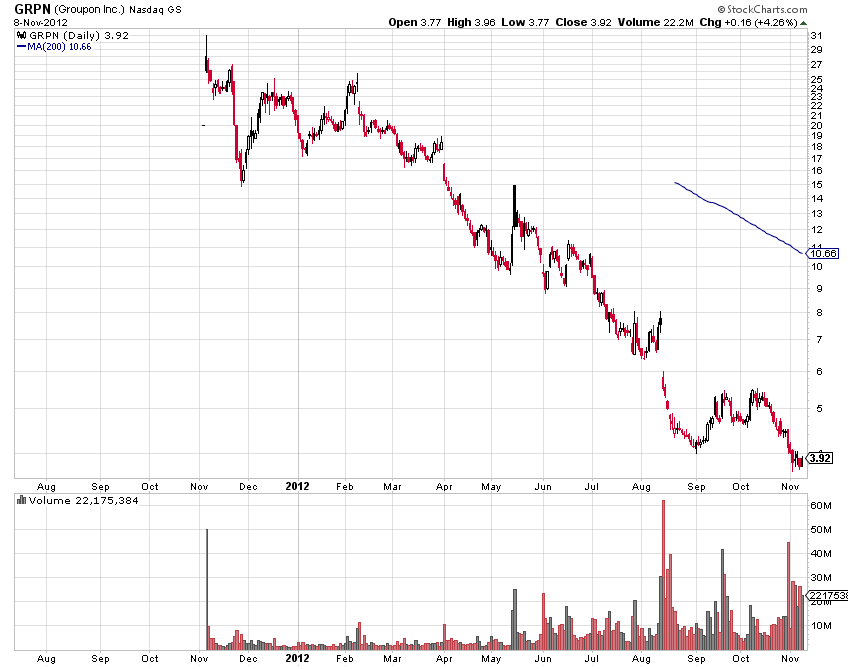
The Facebook (FB) IPO scandal continues to develop as news recently surfaced that Facebook's underwriters spent an estimated $66 million supporting the company's stock price to desperately prevent it from falling below $40 per share in its first day of trading. The cost of supporting Facebook's stock price is likely to have slashed about 40% of the underwriters' commissions as the underwriters became more concerned about preserving their reputations instead of their profits on the deal.
Despite Facebook's underwriters' costly efforts to support the stock, it has halved in price since their IPO. Mark Zuckerberg saw his fortune fall by $8.1 billion due to the decline in Facebook stock. Facebook's stock may come under even more pressure as 777 million additional shares become available for sale on November 14th as post-IPO share "lock-ups" expire, in addition to 156 million more on December 14th and 47 million more on May 18th, 2013.
Here's Facebook's stock chart: 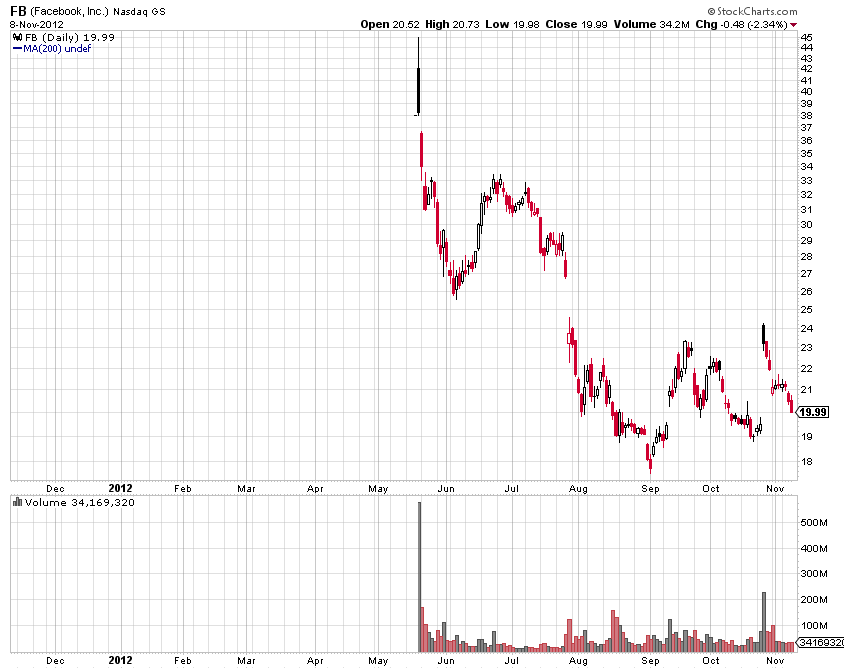
On October 25th, online music service Pandora (P) sank by more than 14% within minutes, resulting in the stock being halted, as a rumor floated that Apple (AAPL) planned to launch its own competing internet radio service.
Here's Pandora's stock chart: 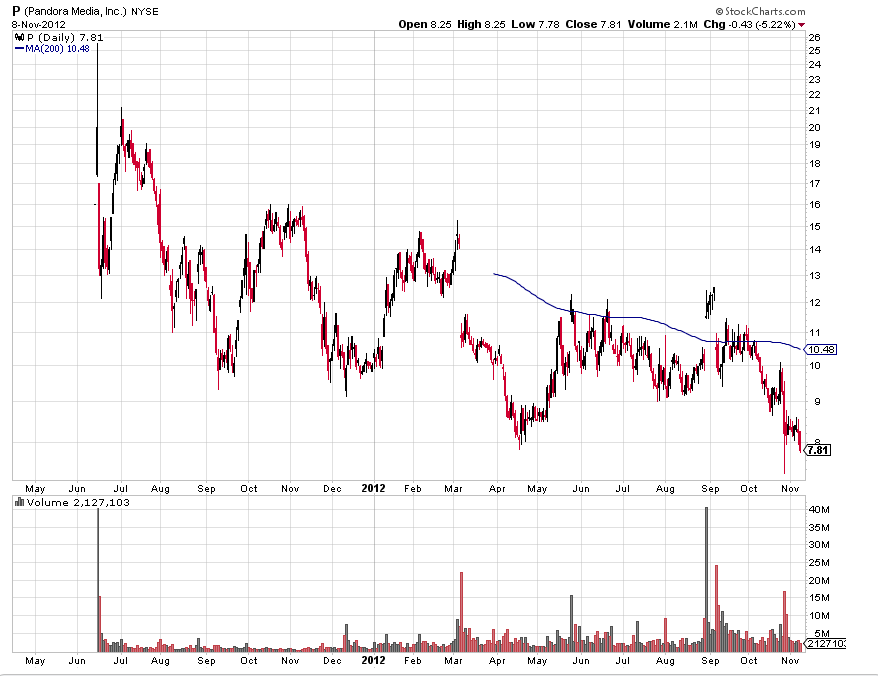
Shares of Yelp (YELP), a user-generated business review site, have had their value slashed by 40% since early October as revenue growth has proven to be disappointing.
As investor and entrepreneur enthusiasm for all things "social" rapidly dwindles, measures of public interest, aside from stock prices, have rapidly declined as evidenced by this chart of Google searches for the keyword "social media startups" (source): 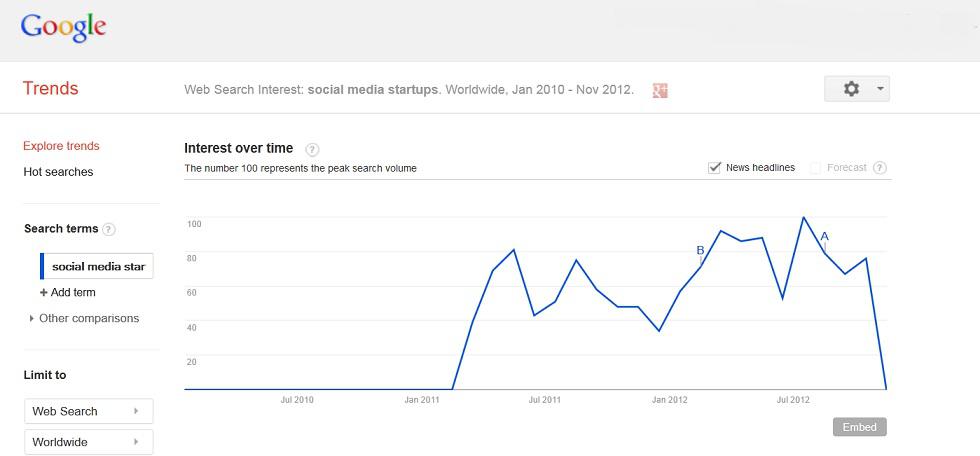
At the same time, it is worth watching to see if the Google search volume for the term "startups" will soon decline, after soaring in 2011 and 2012 (which I view as evidence of a tech startup bubble) (source):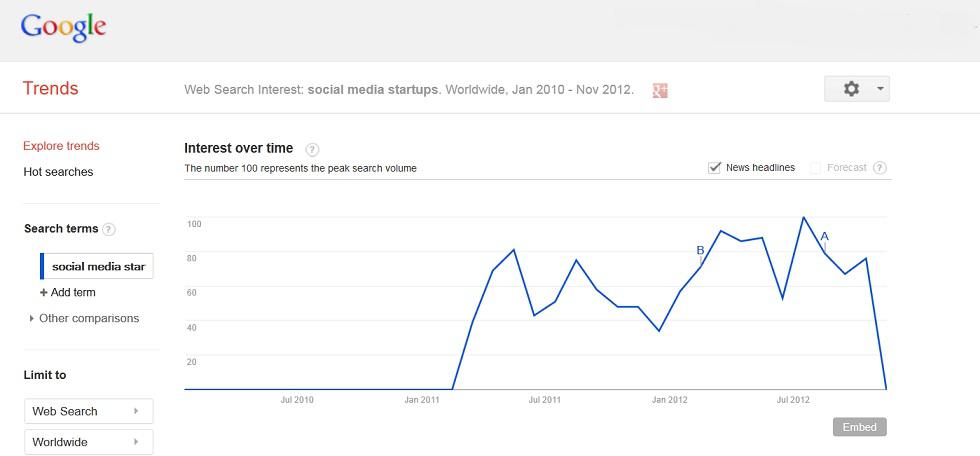
Is LinkedIn the Next Social Media Shoe to Drop?
I have discussed a sampling of just a few of the recent social media stock disasters, but there has been one company that has, so far, escaped the wrath of gravity: LinkedIn (LNKD). After doubling in price from January 2012 until its recent peak in September, LinkedIn is being lauded by the investment community as the one public social media company that has its "act together." As such, a portion of the prior hype that was being projected on former high-flying social media companies, such as Facebook and Groupon, has recently been transferred to and concentrated on LinkedIn.
The general public, in my view, still has irrationally high hopes for the commercial success of social media companies and LinkedIn, one of the last vestiges of the social media dream, is expected by many to carry the torch for the sector going forward. These irrationally high hopes can certainly be seen in LinkedIn's astronomical 1,000 P/E ratio (source), which is far too rich even when taking into consideration the company's healthy expected 5-year earnings growth rate of 64.69%. Richly-valued growth stocks, such as LinkedIn, have a strong tendency of plunging if there is even a slight disappointment in revenue and earnings growth. Netflix is a great example of this phenomenon (chart). What is particularly worrisome is the fact that LinkedIn's GAAP net income has declined for the last four quarters, while revenue growth rates are declining, which is not a good sign for a company with such high growth expectations (source).
LinkedIn is clearly one of the more solid social media companies in terms of their underlying business; my gripe is not with their business, but with their excessive valuations.
From a technical analysis standpoint, LinkedIn is showing serious chart damage after breaking its one year-old uptrend line, its 200 day moving average and the psychologically-critical $100 level (round numbers tend to act as support/resistance levels): 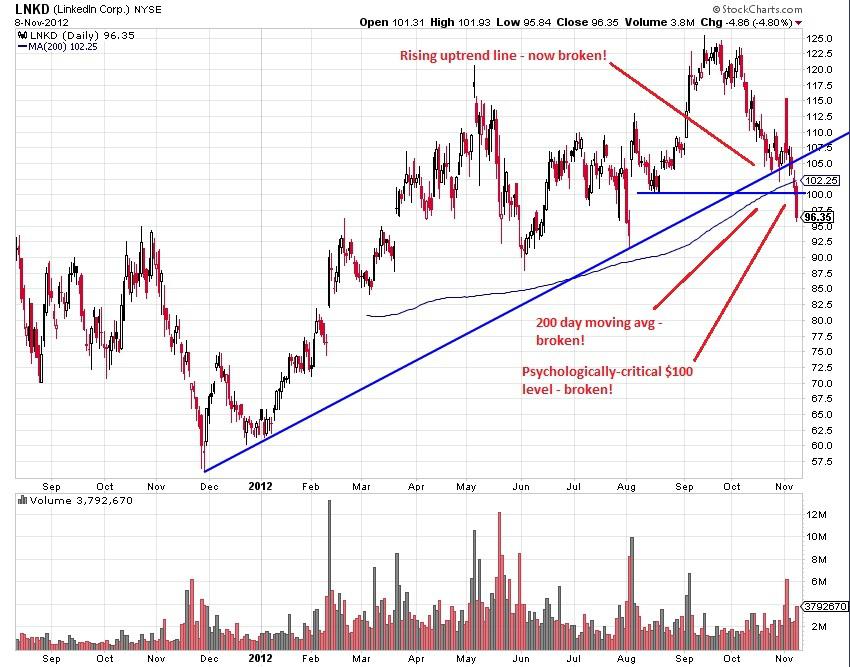
It is very possible that LinkedIn is the next shoe of the social media bubble to drop and the stock may experience a significant decline at some point in the future. I believe that a significant decline in LinkedIn's stock price would deal a powerful blow to the overall social media bubble because the valuations of publicly-traded social media companies set the tone and valuations for the private companies and startups in this sector. As I have said before, I believe that the social media startup boom was predicated on the high valuations of the large bellwether social media companies (Facebook, LinkedIn, Groupon) as many startups were formed for the purpose of "flipping" or cashing-out at very high prices via buyouts or IPOs, regardless of whether the startup is profitable or not.
(I am not actually predicting an immediate decline in LinkedIn's stock price; I am simply pointing out how vulnerable this company is to such a dramatic decline and how it can affect the sentiment of the overall social media sector.)
I still believe that the social media sector is overvalued as a whole, even after the steep recent stock declines. Many public social media companies have no earnings to speak of (Yelp, ANGI, P, ZNGA). There are even many parallels between the social media bubble and the solar and alternative energy sector bubble of 2007-2008, which has resulted in spectacular stock price declines for the companies involved (STP, FSLR, etc). When social media company stocks ultimately trade at far lower prices, the sector's hype will die down and the tech startup boom will likely grind to a halt.
As an anti-economic bubble activist and researcher, I am very concerned with the economic impact of the social media bubble's popping as I believe that the social media bubble has played a very important role in the U.S.' post-2009 "bubblecovery" or bubble-driven economic recovery. The social media bubble has helped to create nearly 500,000 U.S. jobs in recent years (a very high percentage of newly-created jobs) and has helped to launch a housing and commercial real estate recovery in hard-hit San Francisco and parts of New York City. The social media bubble has contributed to an explosion in post-2009 entrepreneurial activity, with the number of startup incubators tripling from 2009 to 2011. The social media bubble is also important, because it has been one of the few glimmers of economic hope that many Americans have had in recent years, especially for young aspiring-professionals who see few other appealing career options (1, 2, 3). I cannot overemphasize the importance of hope and optimism in dire times such as these; the economy and financial markets are driven by human psychology, and having a reason for hope is what many people need to keep charging on (for example: "If Mark Zuckerberg can make it in these times, so can I!" or "At least some businesses are still booming!").
Disclosure: I don't personally hold any trading positions on any of these stocks discussed here, but placing bets against LinkedIn is one possible way to play the next phase of the social media bubble.
- English (UK)
- English (India)
- English (Canada)
- English (Australia)
- English (South Africa)
- English (Philippines)
- English (Nigeria)
- Deutsch
- Español (España)
- Español (México)
- Français
- Italiano
- Nederlands
- Português (Portugal)
- Polski
- Português (Brasil)
- Русский
- Türkçe
- العربية
- Ελληνικά
- Svenska
- Suomi
- עברית
- 日本語
- 한국어
- 简体中文
- 繁體中文
- Bahasa Indonesia
- Bahasa Melayu
- ไทย
- Tiếng Việt
- हिंदी
Is LinkedIn The Next Social Media Shoe To Drop?
Published 11/13/2012, 06:50 AM
Updated 07/09/2023, 06:32 AM
Is LinkedIn The Next Social Media Shoe To Drop?
3rd party Ad. Not an offer or recommendation by Investing.com. See disclosure here or
remove ads
.
Latest comments
Install Our App
Risk Disclosure: Trading in financial instruments and/or cryptocurrencies involves high risks including the risk of losing some, or all, of your investment amount, and may not be suitable for all investors. Prices of cryptocurrencies are extremely volatile and may be affected by external factors such as financial, regulatory or political events. Trading on margin increases the financial risks.
Before deciding to trade in financial instrument or cryptocurrencies you should be fully informed of the risks and costs associated with trading the financial markets, carefully consider your investment objectives, level of experience, and risk appetite, and seek professional advice where needed.
Fusion Media would like to remind you that the data contained in this website is not necessarily real-time nor accurate. The data and prices on the website are not necessarily provided by any market or exchange, but may be provided by market makers, and so prices may not be accurate and may differ from the actual price at any given market, meaning prices are indicative and not appropriate for trading purposes. Fusion Media and any provider of the data contained in this website will not accept liability for any loss or damage as a result of your trading, or your reliance on the information contained within this website.
It is prohibited to use, store, reproduce, display, modify, transmit or distribute the data contained in this website without the explicit prior written permission of Fusion Media and/or the data provider. All intellectual property rights are reserved by the providers and/or the exchange providing the data contained in this website.
Fusion Media may be compensated by the advertisers that appear on the website, based on your interaction with the advertisements or advertisers.
Before deciding to trade in financial instrument or cryptocurrencies you should be fully informed of the risks and costs associated with trading the financial markets, carefully consider your investment objectives, level of experience, and risk appetite, and seek professional advice where needed.
Fusion Media would like to remind you that the data contained in this website is not necessarily real-time nor accurate. The data and prices on the website are not necessarily provided by any market or exchange, but may be provided by market makers, and so prices may not be accurate and may differ from the actual price at any given market, meaning prices are indicative and not appropriate for trading purposes. Fusion Media and any provider of the data contained in this website will not accept liability for any loss or damage as a result of your trading, or your reliance on the information contained within this website.
It is prohibited to use, store, reproduce, display, modify, transmit or distribute the data contained in this website without the explicit prior written permission of Fusion Media and/or the data provider. All intellectual property rights are reserved by the providers and/or the exchange providing the data contained in this website.
Fusion Media may be compensated by the advertisers that appear on the website, based on your interaction with the advertisements or advertisers.
© 2007-2024 - Fusion Media Limited. All Rights Reserved.
